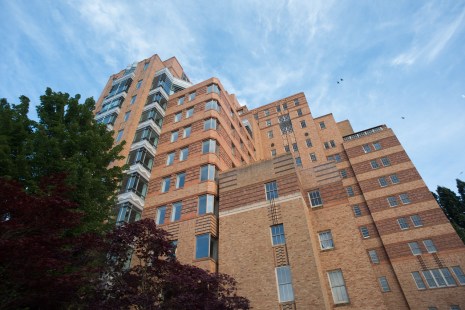New Health Education Center trains students, serves community

The demand for healthcare workers is expected it increase significantly in the Puget Sound region in the coming years. In response, Seattle Central College will open the doors to expanded healthcare education opportunities at its new Health Education Center at Pacific Tower. The new space, complete with state-of-the-art-equipment, is designed to foster collaborative learning to educate the next generation of healthcare professionals.
“Launching a campus that is on the cutting-edge of healthcare education will change how we prepare our students for the industry,” says Interim President Sheila Edwards Lange, Ph.D. “This center will provide new opportunities for our students, but also for the community, who will benefit from the services our students and graduates will provide.”
On the cutting-edge
The Health Education Center is an 85,000-square-foot facility located on five floors of the Pacific Tower. The center is equipped with modern labs outfitted with the latest medical and diagnostic equipment to help students gain essential experience. The center also includes computer labs, a library, classrooms and administrative offices.
Collaborative training experience
One of the unique features of the new space is the collaboration with other organizations. For example, Neighborcare Health will co-locate a community dental clinic at the center. This partnership, the first of its kind in the nation, provides hands-on training opportunities to students while increasing access to affordable healthcare for low-income patients in the community.
“By locating a Neighborcare dental clinic with the college’s dental training programs, we are helping to pioneer a new model of health education. As a result, each student will be much better prepared for the rigors of a healthcare workplace,” says Sarah Vander Beek, Chief Dental Officer at Neighborcare Health.
The vision for the Pacific Tower includes a variety of health-focused non-profit organizations under one roof, such as Cross Cultural Health Care, which provides medical interpreter training, and Valley Cities, a non-profit mental health provider.
Expanded programs
The center has spurred the development of new programs that better address the needs of the evolving healthcare industry. In 2015, the college began offering two new Allied Health bachelor’s degree tracks in Community Health and Education and in Healthcare Services Management in addition to the Respiratory Care and Dental Hygiene options. These degrees create opportunities for healthcare workers to enhance their professional skills and advance in their careers.
Accessible and affordable
With a commitment to ensuring quality education for all, Seattle Central is also making healthcare education both accessible and affordable. Courses have been designed with working professionals in mind. Certain programs, such as Central Supply Processing and Certified Nursing Assistant, give those with no experience in healthcare the opportunity to earn a certificate in just a few quarters.
“Seattle Central is effective in making its training programs accessible to all, including Asian/Pacific Islanders and other immigrants and refugees,” Teresita Batayola, a Seattle Colleges Trustee and CEO of International Community Health Services says.
Current healthcare professionals can build on their expertise and education by working toward associate and bachelor’s degrees. Programs include day, evening and online classes that give those with busy family and work commitments the opportunity to earn more advanced healthcare credentials at their own pace.